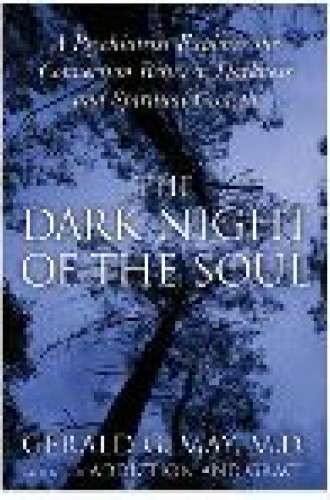The Dark Night of the Soul: A Psychiatrist Explores the Connection Between Darkness and Spiritual Growth
Saints such as the 16th-century Carmelites Teresa of Ávila and John of the Cross have become guardians of others across time—certainly so for the American psychiatrist Gerald May, who takes to heart their remarks and their manner of engaging a religion they dared regard with unstinting attention and with the blunt honesty love can prompt. May’s book is a thankful acknowledgment of assistance received; it beckons readers to connect in mind, heart and soul with these two writer-saints.
Especially noteworthy is May’s unwillingness to call upon today’s psychological language to label these mystics as candidates for psychotherapeutic diagnosis and treatment. Yes, Teresa and John had their doubts and misgivings, their spells of dampened spirits, but they were above all explorers of human inwardness and narrators of what they had carefully noted in their own self-examinations. Their intelligent, articulate minds are in no need of the reductionist labeling all too commonly employed these days by certain members of the clergy.
For May, the point is appreciation (even admiration) rather than forays into self-serving and self-promoting clinical speculation: “I think there are several reasons Teresa and John were such excellent psychologists. First, like other contemplatives, they learned their psychology firsthand, through acute, extended and direct attentiveness to their own interior lives,” he writes. May carefully describes the world to which Teresa and John of the Cross belonged: “They were deeply immersed in community” and “had exquisite gifts for communicating their insight through poetry, story, metaphor and concept.”
St. John’s The Dark Night of the Soul has to do with a journey of faith, with the trials and opportunities that go with such efforts: the anticipation, the hope, the purpose, the will. Indeed, as Elie Wiesel told us in Night, and as Shakespeare sang to us in Romeo and Juliet, even terrible loss, even death itself, can redemptively change things (turning night into day, so to speak, and vice-versa): “When he shall die,/ Take him and cut him out in little stars,/ And he will make the face of heaven so fine/ That all the world will be in love with night,/ And pay no worship to the garish sun,” Shakespeare writes.
Those who bravely take on the darker side of things, within themselves and in the world, remind us how far and deep we can travel in the time given us. God’s creatures become God’s watchful, ardent witnesses of life—as it proceeds in monasteries and those who inhabit them, or in churches and those who attend them.





